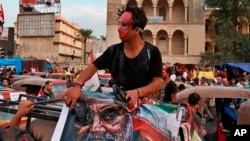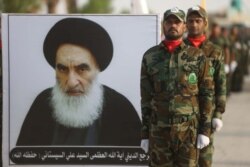As Iraqi protesters burn effigies of Iran's Supreme Leader Ayatollah Ali Khamenei and set fire to Iran's consulate in Karbala, 40 years of Iranian policy towards its neighbors appears to be going down the drain.
Iraqi protesters in Baghdad chanted slogans against Iran's Shi'ite proxy militias in their country as they set fire to pictures of Iran's Supreme Leader Ayatollah Ali Khamenei and his top regional commander Gen. Qassem Suleimani. Iran warned its citizens not to travel to Iraq last week, as protests spread to the country's Shi'ite holy sites.
Crowds of mostly young Iraqi protesters set fire to parts of the Iranian consulate in the Shi'ite holy city of Karbala Sunday, as young men with Iraqi flags danced on the walls outside the building. Protesters also set fire to party offices of pro-Iranian militia groups in several cities, as popular wrath turned against Tehran and its agents.
Iran's Supreme Leader Ayatollah Ali Khamenei provoked the anger of many Iraqis last week after he accused foreign countries of fomenting protests in both Iraq and Lebanon:
He says that the United States and some Western and Gulf states have been using their intelligence agencies to support the riots and chaos (in Lebanon and Iraq).
Iraq's top Shi'ite leader Grand Ayatollah Ali Sistani — through the mouth of his Friday prayer leader Seyyid Ali Safi — told Iraqis that no outside forces can tell Iraqis what to do:
He says that no one, group, faction, or regional or international power can hijack the will of the Iraqi people and impose its own will on them.
Amateur video showed protesters tossing Iranian products from the shelves of supermarkets as groups on social media urged Iraqis to boycott anything made in Iran.
Iraq is a major consumer of Iranian products as trade between the two countries reached $13 billion in 2018. Iranian Foreign Minister Mohammed Javad Zarif said during a visit to Baghdad several months ago that he hoped trade would rise to $20 billion in 2019.
Analyst Sabah al-Mukhtar told Al Hurra TV that Iran has been using Iraq as a conduit to circumvent US economic sanctions that have been imposed on Tehran since Washington withdrew from the 2015 nuclear accord (JCPOA) in May 2018:
He says that Iraq is Iran's main window by which to get around U.S. sanctions, be it with oil, industrial goods, or with U.S. dollars.
Iraqi protesters have also been blocking the country's main Gulf port of Umm Qasr for nearly a week, blocking many items from entering the country from Iran.
Former Iranian President Abolhassan Bani Sadr, who lives in exile in France, tells VOA the ongoing popular protests in both Iraq and Lebanon "have made a shambles of nearly 40 years of policy by the Iranian regime to create a crescent that unites Iran to Iraq, Syria and Lebanon."
"[Supreme Leader] Ayatollah Khamenei," he says, "cannot explain to his own people how 40 years of efforts, backed by blood and treasure, have gone down the drain so quickly with these popular movements."
"Both Iraqis and Lebanese are telling their leaders," he argues, "that they want democratic governments and not regimes imposed by Tehran."













